Related Research Articles
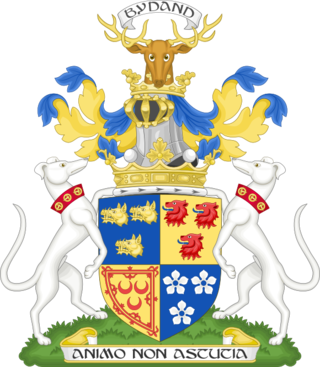
Marquess of Huntly is a title in the Peerage of Scotland that was created on 17 April 1599 for George Gordon, 6th Earl of Huntly. It is the oldest existing marquessate in Scotland, and the second-oldest in the British Isles; only the English marquessate of Winchester is older. The Marquess holds the following subsidiary titles: Lord Gordon of Strathaven and Glenlivet and Earl of Aboyne, and Baron Meldrum, of Morven in the County of Aberdeen.

The title Earl of Moray, Mormaer of Moray or King of Moray was originally held by the rulers of the Province of Moray, which existed from the 10th century with varying degrees of independence from the Kingdom of Alba to the south. Until 1130 the status of Moray's rulers was ambiguous and they were described in some sources as "mormaers", in others as "Kings of Moray", and in others as "Kings of Alba". The position was suppressed by David I of Scotland some time after his defeat of Óengus of Moray at the Battle of Stracathro in 1130, but was recreated as a feudal earldom by Robert the Bruce and granted to Thomas Randolph, 1st Earl of Moray in 1312.
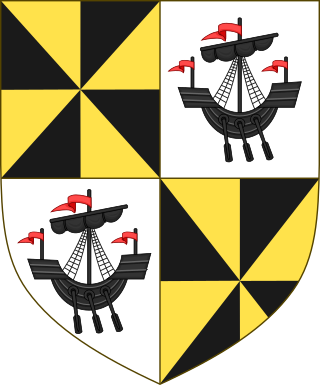
Colin Campbell, 1st Earl of Argyll was a medieval Scottish nobleman, peer, and politician. He was the son of Archibald Campbell, Master of Campbell and Elizabeth Somerville, daughter of John Somerville, 3rd Lord Somerville. He had the sobriquet Colin Mulle, Bold Earl Colin.
George Gordon, 4th Earl of Huntly was a Scottish nobleman.
James Stewart, 2nd Lord Doune, 2nd Earl of Moray was a Scottish nobleman, the son of James Stewart, 1st Lord Doune and Margaret Campbell. He was murdered by George Gordon, Earl of Huntly as the culmination of a vendetta. Known as the Bonnie Earl for his good looks, he became the subject of a popular ballad, "The Bonnie Earl of Moray".

James Hamilton, 1st Earl of Arran and 2nd Lord Hamilton was a Scottish nobleman, naval commander and first cousin of James IV of Scotland. He also served as the 9th Lord High Admiral of Scotland.

Clan Drummond is a Highland Scottish clan. The surname is rendered "Druimeanach" in modern Scottish Gaelic.
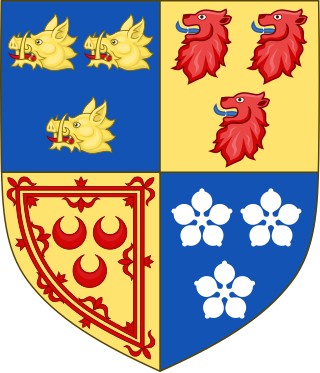
Alexander Seton, 1st Earl of Huntly, who adopted the family name of Gordon from about 1457, was a powerful 15th-century Scottish magnate. He was knighted in 1439/1440 and was Lord of Badenoch, Gordon, Strathbogie and Cluny.

William Duff, 1st Earl Fife, of Braco, Banff, was a Scottish landowner and politician who sat in the House of Commons from 1727 to 1734.

James Stuart, 4th Earl of Moray was a Scottish landowner.
James Stuart, 3rd Earl of Moray was the son of James Stewart, 2nd Earl of Moray and Elizabeth Stuart.
George Gordon, 2nd Earl of Huntly was a Scottish nobleman and Chancellor of Scotland from 1498 to 1501.
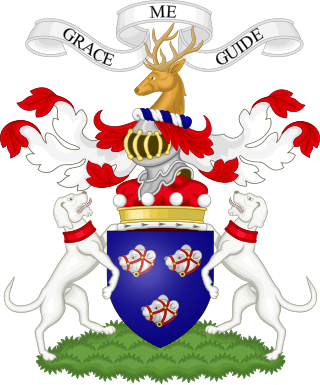
Clan Forbes is a Highland Scottish clan from Aberdeenshire, Scotland.
Alexander Gordon, 3rd Earl of Huntly was a Scottish nobleman. He was a member of Parliament, a member of the Privy Council, a regent and Lieutenant of the kingdom.
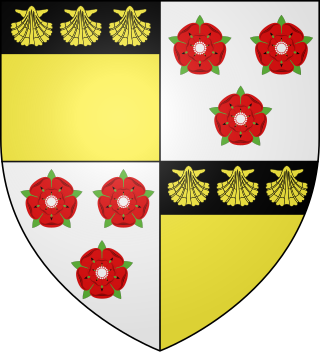
William Graham, 1st Earl of Montrose was a Scottish Lord of Parliament, who was raised to an earldom by James IV of Scotland and who died with his monarch at the Battle of Flodden.
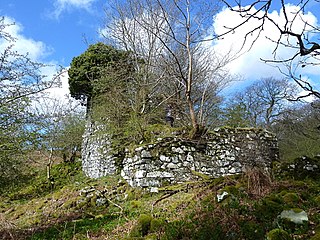
Alexander Stewart, 1st Earl of Galloway was a Scottish courtier and landowner.
Elizabeth Gordon, Heiress of Gordon, Scottish baroness and progenitress of the Gordon Earls and Marquesses of Huntly.
Alexander Seton, Lord Gordon was a Scottish baron, Lord of Parliament and progenitor of the Gordon Earls and Marquesses of Huntly.
John Gordon, 11th Earl of Sutherland (1525–1567) was a Scottish magnate. John Gordon supported the chief of his family, his cousin the Earl of Huntly against the Earl of Moray. After Huntly's defeat at Corrichie, he went into exile, and shortly after his return to Scotland he was murdered by a kinswoman.

Ludovick Grant, 1st of Grant and 8th of Freuchie (1641–1717) was a Scottish politician and soldier. He was the 19th Chief of Clan Grant and referred to as the "Highland King."
References
- 1 2 3 4 John Malcolm Bulloch, ed. (1907). House of Gordon. p. 134.
- ↑ John Malcolm Bulloch, ed. (1907). House of Gordon. p. 122.
- ↑ The Popular Scotish Biography: Being Lives of Eminent Scotsmen, Parts 1-8
- ↑ Cracroft's Peerage - The Complete Guide to the British Peerage & Baronetage